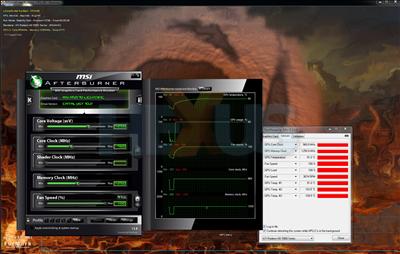HEXUS.bang4buck and overclocking
In a rough-and-ready assessment of the cards' bang for buck, we've aggregated the 1,920x1,200 frame-rates for four games, normalised them* and taken account of the cards' prices.
But there are more provisos than we'd care to shake a stick at. We could have chosen four different games, the cards' prices could have been derived from other sources and pricing tends to fluctuate daily.
Consequently, the tables below highlight a metric that should only be used as a yardstick for evaluating comparative performance with price factored in. Other architectural benefits are not covered, obviously.| Graphics cards | MSI Radeon HD 5870 Lightning 1,024MB | Sapphire Radeon HD 5830 1,024MB | HIS Radeon HD 5850 1,024MB | HIS Radeon HD 5870 1,024MB | Inno3D GeForce GTX 260 OC 896MB | EVGA GeForce GTX 275 896MB | BFG GeForce GTX 285 OC |
|---|---|---|---|---|---|---|---|
| Actual aggregate marks at 1,920x1,200 | 273.67 | 180.6 | 230.21 | 268.41 | 172.05 | 186.42 | 216.59 |
| Aggregate marks, normalised*, at 1,920x1,200 | 225.09 |
153.53 |
197.01 | 221.7 | 147.63 | 165.89 |
188.8 |
| Current price, including VAT | £360 | £215 | £225 | £310 | £140 | £195 | £285 |
| HEXUS.bang4buck score at 1,920x1,200 | 0.625 | 0.714 | 0.876 | 0.715 | 1.054 | 0.851 | 0.662 |
* the normalisation refers to taking playable frame rate into account. Should a card benchmark at over 60 frames per second in any one game, the extra fps count as half. Similarly, should a card benchmark lower, say at 40fps, we deduct half the difference from its average frame rate and the desired 60fps, giving it a HEXUS.bang4buck score of 30 marks. The minimum allowable frame rate is 20fps but that scores zero.
The HEXUS.bang4buck score only takes the performance and price into account, of course.
Evaluation
The normalised performance is 1.5 per cent better than a reference card. The expected etail price is 16.1 per cent higher. Do the simple maths and the HEXUS.bang4buck, which is already low for the HD 5870, drops to 0.625 for the MSI card.
But just looking at shipping performance is missing the point somewhat.
Overclocking
The card is clearly designed for overclocking and it would be an egregious error not to cover it. Increasing the voltage from the default 1.164V to 1.25V, we managed to hit a final speed of 960MHz core and an effective 5,000MHz memory - up from the shipping 900MHz/4,800MHz clocks.
The increases are lower than we expected on the memory, but increasing voltage any farther would push the GPU temperature close to 100°C. Even at this 1.25V setting the system-wide power-draw rises from 355W to 430W.
Default DiRT 2 performance at 1,920x1,200 is 80.2fps. The overclocked card produces a score of 83.85fps.










